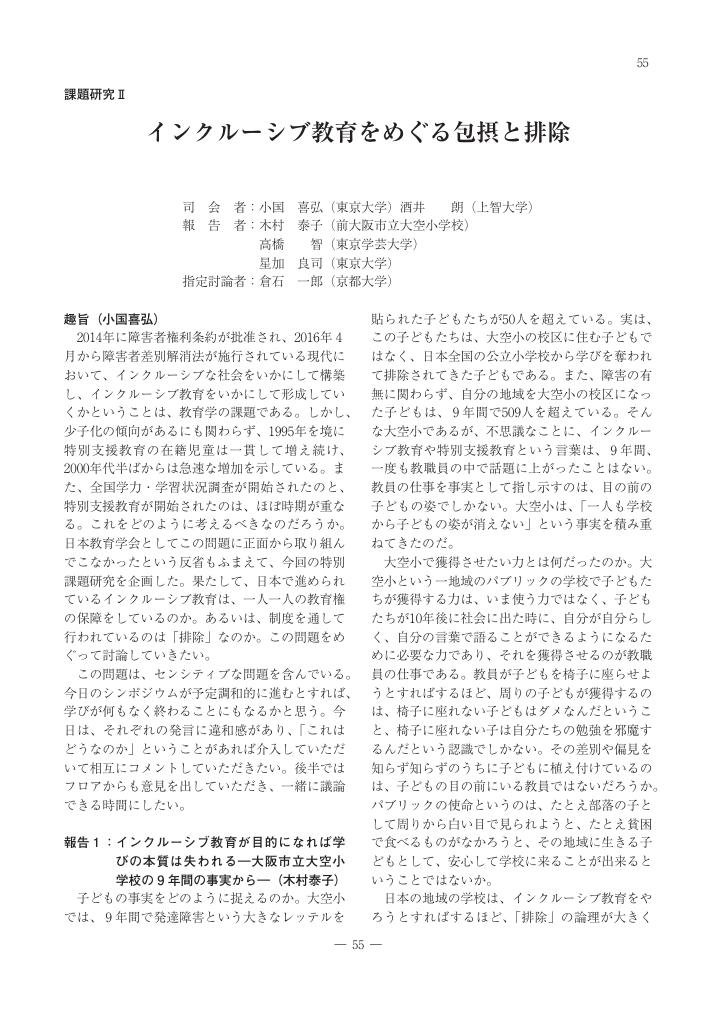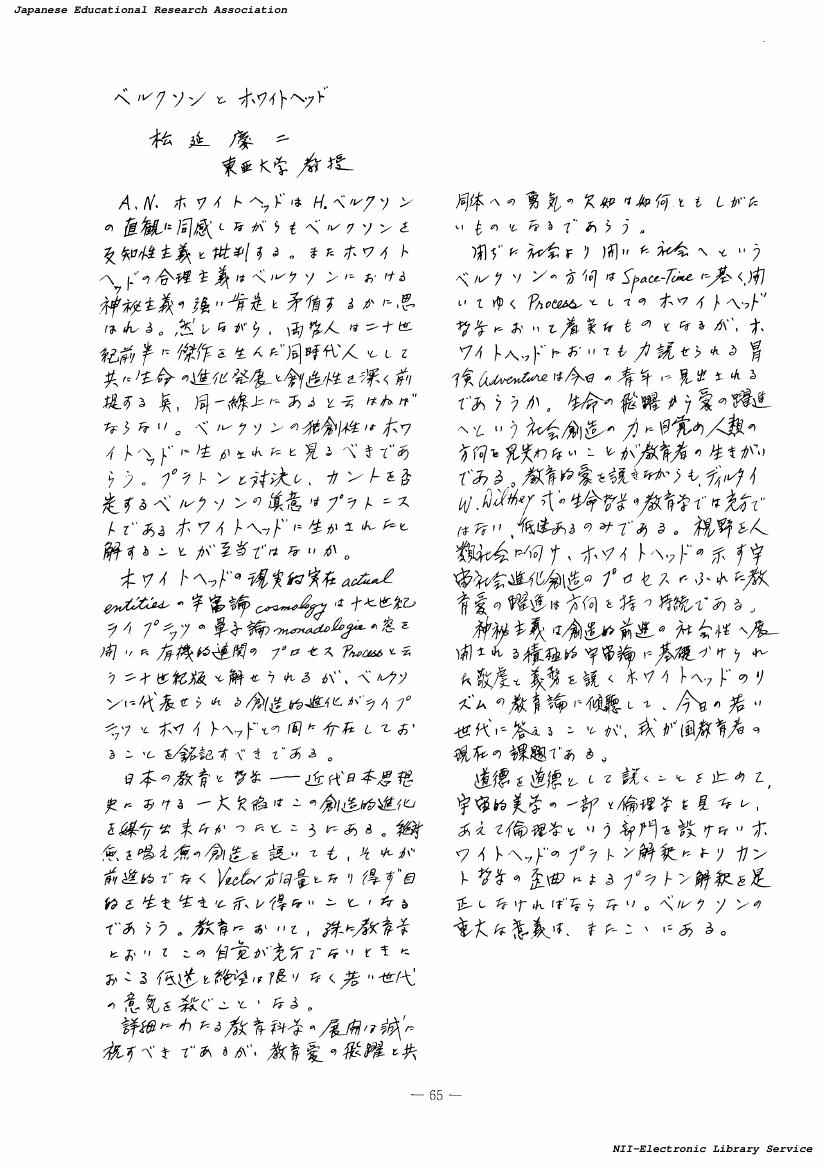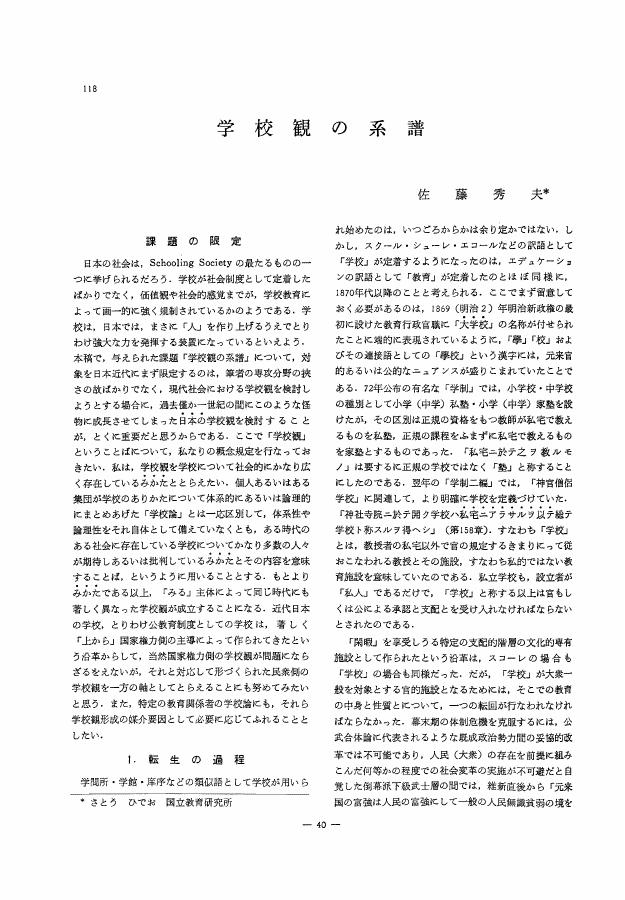1 0 0 0 OA 近世の元服と教育 庶民層を中心として
- 著者
- 尾形 裕康
- 出版者
- 一般社団法人 日本教育学会
- 雑誌
- 教育学研究 (ISSN:03873161)
- 巻号頁・発行日
- vol.20, no.1, pp.60-73, 1953 (Released:2009-01-13)
- 参考文献数
- 74
1 0 0 0 OA 聖徳太子における教育と政治と宗教
- 著者
- 久木 幸男
- 出版者
- 一般社団法人 日本教育学会
- 雑誌
- 教育学研究 (ISSN:03873161)
- 巻号頁・発行日
- vol.24, no.2, pp.13-24, 1957-04-25 (Released:2009-01-13)
- 参考文献数
- 2
1 0 0 0 OA 旧学制下高知県の私立中学生徒の動向 ―私立土佐中学校を事例としてー
- 著者
- 湯田 拓史
- 出版者
- 一般社団法人 日本教育学会
- 雑誌
- 日本教育学会大會研究発表要項 (ISSN:2433071X)
- 巻号頁・発行日
- vol.77, pp.55-56, 2018 (Released:2019-12-05)
1 0 0 0 OA 公教育におけるハイ・ステークス(high-stakes)な教育改革(<特集>公教育再考)
- 著者
- 恒吉 僚子
- 出版者
- 一般社団法人 日本教育学会
- 雑誌
- 教育学研究 (ISSN:03873161)
- 巻号頁・発行日
- vol.67, no.4, pp.417-426, 2000-12-30 (Released:2007-12-27)
- 被引用文献数
- 1
本稿は「最後の手段」ともしばしば呼ばれる、リコンステイテューションを用いた改革を、メリーランド州、プリンス・ジョージズ郡、A小学校の事例を切り口に検討している。リコンステイテューションとは企業モデル的発想に基づき、「破産」、つまり、恒常的な学力不振に悩まされるとされる学校の教職員の入れ換えを軸とした改革である。測定できる指標をもとにしたアカウンタビリティを重視し、市場競争に依拠した教育改革は多くの国(米国や日本も含み)で一つの流れとなっている。プリンス・ジョージズ郡で展開された本稿で取り上げる改革方式は、成功の指標としてテストの結果を重視する。本稿では、プリンス・ジョージズ郡のA校を取り上げ、リコンステイテューション実行の前後、一九九五年から二〇〇〇年にかけて、一から二週間単位の三回のインタビュー、観察調査のデータを分析している。焦点になっているA校は大多数がマイノリティの小学校であり、一九九七年五月にリコンステイテューションの対象になっている。教育長、郡のスタッフ、校長以下一部教職員のインタビューと学校観察が行われた。本稿は、前記郡におけるリコンステイテューションのプロセスを分析し、教育コンテクストにおいて、企業における大量レイオフを正当化する理論に類似した発想による教育員の入れ換えを批判的に取り上げる。さらに、本稿は前記懲罰的改革が示す、特定の学校、教師の守備範囲を超えた社会的条件による学力不振をも教育ヒエラルキーの底辺に位置する教師に責任転嫁する傾向、教育における対人関係的要素の軽視、市場競争力に欠ける学校の再建を市場原理に委ねる傾向も、批判的に分析している。
1 0 0 0 OA インクルーシブ教育をめぐる包摂と排除
- 出版者
- 一般社団法人 日本教育学会
- 雑誌
- 教育学研究 (ISSN:03873161)
- 巻号頁・発行日
- vol.84, no.1, pp.55-60, 2017-03-30 (Released:2017-07-28)
1 0 0 0 OA 大学院改革の動向 : 専門職大学院の整備と拡充(<特集>「教育」問題としての大学改革)
- 著者
- 山田 礼子
- 出版者
- 一般社団法人 日本教育学会
- 雑誌
- 教育学研究 (ISSN:03873161)
- 巻号頁・発行日
- vol.70, no.2, pp.148-164, 2003-06-30 (Released:2007-12-27)
- 参考文献数
- 45
- 被引用文献数
- 1
1 0 0 0 OA 初等算数教科書としての「塵劫記」
- 著者
- 川本 亨二
- 出版者
- 一般社団法人 日本教育学会
- 雑誌
- 教育学研究 (ISSN:03873161)
- 巻号頁・発行日
- vol.35, no.2, pp.105-114, 1968-08-01 (Released:2009-01-13)
- 参考文献数
- 28
1 0 0 0 OA 評価への「抗体」としてのドキュメンテーション 価値・意味生成・翻訳
- 著者
- 浅井 幸子
- 出版者
- 一般社団法人 日本教育学会
- 雑誌
- 教育学研究 (ISSN:03873161)
- 巻号頁・発行日
- vol.86, no.2, pp.249-261, 2019 (Released:2019-10-12)
本稿は、レッジョ・エミリアの幼児教育におけるドキュメンテーションが、どのような意味で評価―アセスメントおよび/またはエバリュエーション―であるかということを、カルリナ・リナルディ、グニラ・ダールベリ、ヒッレヴィ・レンズ=タグチの議論に即して検討し、ドキュメンテーションが価値中立的なアセスメントの蔓延に対抗するツール、価値付与と意味生成を通した民主主義のツールとして位置付けられていることを示した。
1 0 0 0 OA 自由民権運動の教育史的意義に関する若干の考察 宮城県の場合を事例として
- 著者
- 千葉 昌弘
- 出版者
- 一般社団法人 日本教育学会
- 雑誌
- 教育学研究 (ISSN:03873161)
- 巻号頁・発行日
- vol.39, no.1, pp.12-21, 1972-03-30 (Released:2009-01-13)
- 参考文献数
- 79
- 著者
- 浅沼 茂
- 出版者
- 一般社団法人 日本教育学会
- 雑誌
- 教育学研究 (ISSN:03873161)
- 巻号頁・発行日
- vol.83, no.1, pp.100-101, 2016 (Released:2016-06-27)
1 0 0 0 OA 養護学校における就学義務及び養護学校設置義務と完全義務制実施をめぐって
- 著者
- 三島 敏男
- 出版者
- 一般社団法人 日本教育学会
- 雑誌
- 教育学研究 (ISSN:03873161)
- 巻号頁・発行日
- vol.43, no.2, pp.148-164, 1976-06-30 (Released:2009-01-13)
- 参考文献数
- 27
1 0 0 0 OA 林 透 著『高等教育における視学委員制度の研究 認証評価制度のルーツを探る』
- 著者
- 両角 亜希子
- 出版者
- 一般社団法人 日本教育学会
- 雑誌
- 教育学研究 (ISSN:03873161)
- 巻号頁・発行日
- vol.82, no.2, pp.321-323, 2015 (Released:2016-05-18)
1 0 0 0 OA 学校運営協議会による保護者啓発の論理と帰結
- 著者
- 仲田 康一
- 出版者
- 一般社団法人 日本教育学会
- 雑誌
- 教育学研究 (ISSN:03873161)
- 巻号頁・発行日
- vol.78, no.4, pp.450-462, 2011-12-29 (Released:2018-12-26)
保護者に対し学校に協力する特定の行動を求め、同意の上署名をして提出する「確認書」実践を行う学校運営協議会に着目し、その取組を実現させた論理と帰結を実証的に検討した。その結果導出されたのは、学校選択制下で、学力という成果を求める学校運営協議会が、地域の社会関係を介して保護者に対する問責を生じさせ、保護者を統治する様であった。保護者は然るべき行動を取ることができない場合があるが、それは社会的要因の制約による部分があるにもかかわらず、それへの顧慮は剥ぎ取られたままであった。
1 0 0 0 OA 広島大学における大学改革の思想と現状 教養部改革案を中心として
- 著者
- 山崎 真秀
- 出版者
- 一般社団法人 日本教育学会
- 雑誌
- 教育学研究 (ISSN:03873161)
- 巻号頁・発行日
- vol.36, no.4, pp.319-330, 1970-01-30 (Released:2009-01-13)
- 参考文献数
- 1
1 0 0 0 OA 「同和教育」成立史論 同和奉公会体制下の被差別部落と教育
- 著者
- 松浦 勉
- 出版者
- 一般社団法人 日本教育学会
- 雑誌
- 教育学研究 (ISSN:03873161)
- 巻号頁・発行日
- vol.63, no.4, pp.383-392, 1996-12-30 (Released:2009-01-13)
- 参考文献数
- 64
- 著者
- 松下 丈宏
- 出版者
- 一般社団法人 日本教育学会
- 雑誌
- 教育学研究 (ISSN:03873161)
- 巻号頁・発行日
- vol.71, no.1, pp.40-52, 2004-03-30 (Released:2007-12-27)
In a liberal democratic society, there are two fundamental educational requirements in public education. That is, one is respecting individual rights of freedom of conscience and religion in public education. Another is the reproduction of a liberal democratic society. But apparently there is a tension between the two requirements. Because citizens in a liberal democracy often find religious citizens who claim that they are not always tolerant to others' religious views, and in a name of freedom of religion, their claim should be resoected as a toleration of the intolerant as far as possible. The purpose of this paper is to clarify basic concepts in which the two requirements in public education are compatible. At first, I analyzed two legal cases in the United States. One case was Wisconsin. v. Yoder, and the other case was Mozert v. Hawkins County. I suggested that these two legal cases brought up important questions in relation to the two requirements in public education. In the Yoder case, I suggested that Justice Douglas's dissenting in part was important because of his opinion on the importance of children's rights. In the Mozert case, I clarified the importance of its idea of "civil tolerance" through the analysis of Chief Judge Lively's opinion. Secondly, I analyzed a symposium on "Citizenship. Democracy, and Education" in Ethics(1995). I clarified the contrasting views of civic education in relation to the two requirements in public education through the analysis of the arguments of William, A. Galston and Aym Gutmann. But both of their arguments leave something much to be desired to be compatible for the two requirements in public education. I think that the argument suggested by Stephen Macedo was the most important and systematic in this symposium. Macedo suggests the compelling teaching of civil toleranceto all children is justified in the point of view from a guaranteed equal liberty for all. Furthermore, he pays attention to "political liberalism" which is advocated by John Rawls where I clarified that the compelling teaching of civil tolerance to all children can't be justified by simple guaranteed equal liberty for all, through the analysis of Rawls's thought of "toleration of the intolerance" in political liberalism. Third, I analyzed the educational implications of Rawls's "political liberalism" which were not explicated by Macedo. Rawls suggests the need to distinguish between "public identity" and "nonpublic identity" in pluralistic society. I suggested that this idea is very important to be compatible for the two requirements in public education because this idea was a key concept in justifying the teaching of civil tolerance compelled to all children, and at the same time, protecting their owns right of freedom of religion. Moreover, I consider the implications of this idea, which explicates the significance of traditional public educational system in the United States from a perspedive of the argument of educational institutions.
1 0 0 0 OA ベルクソンとホワイトヘッド
- 著者
- 松延 慶二
- 出版者
- 一般社団法人 日本教育学会
- 雑誌
- 日本教育学会大會研究発表要項 (ISSN:2433071X)
- 巻号頁・発行日
- vol.41, pp.65, 1982-08-02 (Released:2018-04-20)
1 0 0 0 OA 学校観の系譜
- 著者
- 佐藤 秀夫
- 出版者
- 一般社団法人 日本教育学会
- 雑誌
- 教育学研究 (ISSN:03873161)
- 巻号頁・発行日
- vol.45, no.2, pp.118-125, 1978 (Released:2009-01-13)
- 著者
- 湯川 次義
- 出版者
- 一般社団法人 日本教育学会
- 雑誌
- 教育学研究 (ISSN:03873161)
- 巻号頁・発行日
- vol.61, no.2, pp.129-138, 1994-06-30 (Released:2009-01-13)
- 参考文献数
- 66
1 0 0 0 OA デューイ教育学克服の基本的視点の問題教育的認識論建設の課題と方向
- 著者
- 平光 昭久
- 出版者
- 一般社団法人 日本教育学会
- 雑誌
- 教育学研究 (ISSN:03873161)
- 巻号頁・発行日
- vol.33, no.2, pp.127-138, 1966-08-01 (Released:2009-01-13)
- 参考文献数
- 47















